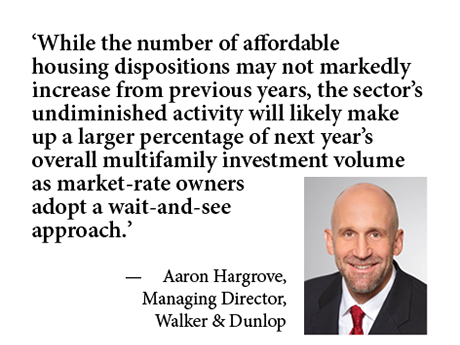
Eric Taylor, Walker & Dunlop
With transaction volume for market-rate housing beginning to ebb, affordable housing investment is poised to play a more central role in the months ahead. Several factors have broadened the allure of affordable housing as an investment vehicle in recent years. When the pandemic began taking a toll on market-rate housing performance, investors saw federal, state and even local governments enact measures to help residents at affordable communities maintain their rent payments and help ensure housing remained available for people struggling financially. We saw the interest level in Section 8 properties, for example, increase significantly during the pandemic, due chiefly to federal guarantees backing those rent streams.
From a financing perspective, the strong commitment shown by Fannie Mae, Freddie Mac and the Federal Housing Administration to preserve liquidity for affordable housing has bolstered development and investment in the space. Due to the required hold periods, affordable housing investments are less affected by market cycles, so liquidity should remain strong.
Now, changing economic forces promise to drive new equity to the affordable sphere and fuel further investment. The Federal Open Market Committee’s resolve to combat record inflation is exerting upward pressure on mortgage rates and, eventually, cap rates, which could discourage sellers and slow transaction volume. As market-rate transaction volume subsides, we expect to see more equity looking for affordable housing opportunities.
The Fed’s rate increases have also upped the likelihood of a near-term recession, which typically dampens the job market and adds to the economic challenges that drive renters to affordable housing. The sector has performed well in the face of economic headwinds, exhibiting strong occupancies and healthy collections through every recent cycle, including the Great Recession. Today, many residents already struggle with high consumer prices. An uptick in unemployment or similar pressures will intensify renter demand for low-cost and subsidized housing.
Additionally, agencies are encouraging lenders to finance new and existing affordable housing projects. That is good news for developers and investors, who may find fewer opportunities in conventional commercial real estate property types as the economy slows. Especially during economic downturns, the affordable housing sector tends to enjoy strong liquidity based on the support of Fannie Mae, Freddie Mac and the FHA. That’s one of the reasons our team is enthusiastic to have joined Walker & Dunlop, which is a lender in all those spaces and is ideally equipped to help clients capitalize on affordable housing opportunities.
LIHTC Life Cycle
Unlike market-rate multifamily investment, transactions involving low-income housing tax credit (LIHTC) properties tend to follow a 15-year life cycle that reflects the typical investment horizon of a tax credit limited partner. Irrespective of what happens in the broader economy, the LIHTC cycle will continue to turn over each year, triggering capital events for thousands of properties ranging from partnership buyouts to sales, refinancing or applications for new program certification. While the number of affordable housing dispositions may not markedly increase from previous years, the sector’s undiminished activity will likely make up a larger percentage of next year’s overall multifamily investment volume as market-rate owners adopt a wait-and-see approach.
It is important to note this 15-year life cycle is limited to LIHTC properties, although Section 8 and Rural Development volume will still benefit from the other factors we’ve described that are fueling affordable housing investment today.
As of early October, 2022, our affordable housing disposition offerings were still drawing offers consistent with pricing established in early spring and summer. Despite volatility in interest rates, our team’s property valuation requests suggests a healthy pipeline for a continuous flow of transactions in 2023, unaffected by broader macroeconomic trends.
Ready for Action
All these market trends point to a busy year ahead for affordable housing investment, and it makes our alignment with Walker & Dunlop both timely and exciting for us and for our clients.
Affordable housing can seem complicated and daunting, especially for new entrants, so much of what we do is helping clients to understand their range of options. Our investment sales professionals, and the rest of Walker & Dunlop’s affordable team, can now present those options more thoroughly and effectively, thanks to the vast scope of services and expertise the firm has brought together.
For example, the affordable investment sales team can provide property owners with unmatched analysis and brokerage services including disposition, refinancing, partnership dissolution, partnership buyout, asset repositioning, resyndication and qualified contract execution. We understand affordable housing programs including Section 8, Section 42 LIHTC and Rural Development, and how the nuances of each affect property valuation. Dispositions are only one aspect of what we bring to the table.
We are able to take a deep dive into every asset. Working with our financing and equity partners, we can help a client to size up current acquisition financing, present refinance options, and run models of resyndication scenarios, in addition to calculating partnership level proceeds from a sale.
As part of Walker & Dunlop, we can now also connect clients with expert advisors to help with their other affordable housing needs, from debt financing and LIHTC equity to affordable housing preservation, appraisals, development support and construction management, and affordable compliance software solutions.
Our firm’s goal of originating $60 billion of affordable and workforce housing loans by 2025 serves to underscore Walker & Dunlop’s commitment to the sector. Our full suite of services, combined with unparalleled affordable experience, exceptional expertise in transaction execution and industry-leading technology position Walker & Dunlop to continue to be a leader and set the standard in affordable housing.
— By Aaron Hargrove, managing director, and Eric Taylor, managing director, Walker & Dunlop. Walker & Dunlop is a content partner of REBusinessOnline. For more articles from and news about Walker & Dunlop, click here.


